Superstorm Sandy Shapes Discussion At Mayoral Forum
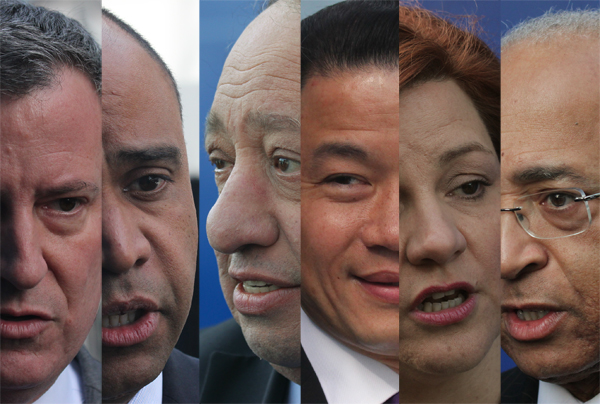
NEW YORK — The hard-earned lessons of Superstorm Sandy shaped a mayoral forum yesterday where candidates fielded questions on waterfront development, expanding ferry service and creating a new agency to oversee the city's vast coastline.
While there was little consensus on a range of topics, most of the candidates agreed that ferry service and renewed infrastructure investments were critical to the future of a working, sustainable waterfront.
The forum was held on a boat moored off of Pier 40 in lower Manhattan for a conference organized by the Metropolitan Waterfront Alliance. Six candidates were asked to respond to a policy proposals put forward by the alliance that touches on everything from docks to land use, as well as questions that were submitted by the public. Chris Ward, the former executive director of the Port Authority of New York and New Jersey, hosted the forum.
Unsurprisingly, the discussion kept turning back to Hurricane Sandy and its aftermath.
"Make no mistake," said Democratic candidate and City Council Speaker Christine Quinn, "you get to say once, 'It was an unprecedented storm.' You don't get to do that again."
RELATED: WHAT FUTURE FOR THE CITY'S WATERFRONT?
Quinn has long described Sandy reconstruction efforts as the single "most important infrastructure project of our time," also telling the audience that she has worked to be a waterfront speaker and would be a waterfront mayor.
She said that the first mass transit service to come back after Hurricane Sandy hit in October was the East River Ferry, which came about during her time as speaker. Quinn, like many of the other candidates, said that her long-term vision is to incorporate cross-borough ferries into the existing mass transit system that includes subways and buses, partially funded by city subsidies not unlike the East River Ferry.
"That's how mass transit works," she said. "It's about the greater good of the city."
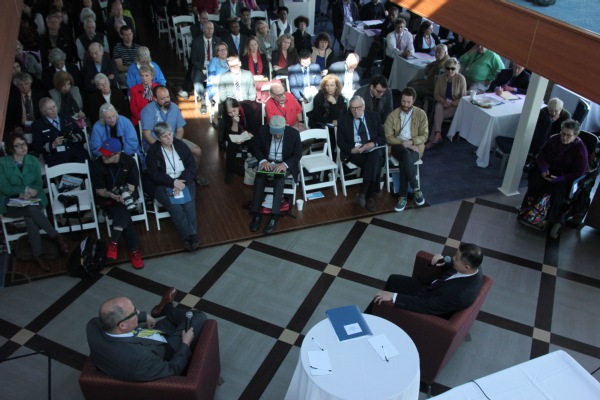
Most of the candidates also said that they saw expanded ferry service as an answer to the city's growing population, a problem that Comptroller John Liu said most cities would love to have. He, along with fellow Democrats Public Advocate Bill de Blasio and former Comptroller Bill Thompson praised Mayor Michael Bloomberg's work on a blueprint for the city’s long-term sustainability, PlaNYC 2030, and recognized the future mayor's role in further sustainable development.
Thompson also repeated his call for the creation of a deputy mayor for infrastructure, who he said would focus on overseeing a comprehensive plan and timetable for development projects, including those related to Sandy recovery and others that may be in the path of future storms.
"The challenges of Lower Manhattan aren't the same challenges in Staten Island, aren't the same challenges in the Rockaways," he said. "That deputy mayor for infrastructure has to coordinate that, has to work in conjunction with the mayor to assume that leadership role."
Thompson was the only Democratic candidate to plainly advocate the creation of a new seat at the new mayor's table. Liu and Quinn both dismissed the idea of a new city agency devoted specifically to the city's waterfronts. Both said such an agency would duplicate responsibilities already given existing agencies affected by Sandy, such as the city's Housing, Education or Homeless Services departments.
Supermarket mogul John Catsimatidis, a Republican, called the idea of either a waterfront department or czar a great idea in unspecific terms. But only former Bronx Borough President and Independence Party nominee Adolfo Carrión declared a waterfront-devoted agency to be a smart solution.
"I know that bureaucracy is a bad word," he said, referring to such a department as a “sledgehammer” to be use for waterfront development.
A former regional director for the U.S. Department of Housing and Urban Development under the Barack Obama administration, Carrión said that the next mayor needs to works across the various levels of government to secure investment in the city's transportation infrastructure.
"I think, without risk of offending too many people, we're kind of dysfunctional in this region," Carrión said, adding that the job of the mayor is to educate the State Legislature about the city's economic force as it doles out federal money for development.
De Blasio also emphasized the idea of a stronger relationship between levels of government, specifically pointing to the mayor's relationship with Washington D.C., and calling the current dynamic unsustainable.
De Blasio, who served as a regional director for HUD under President Bill Clinton, said that the next mayor needs to use his or her bully pulpit to spotlight infrastructure issues on a national stage, not unlike how Bloomberg has dealt with gun control and climate change.
"If you can do Mayors for Gun Control,” he said, referring to Bloomberg’s effort to organize mayors across the country to fight for more limits on guns, “you can do mayors for infrastructure investment."
Part of the public advocate's argument for responsible development, he said, is economic realism. He invoked said pragmatism in response to a question about the ongoing Brooklyn Bridge Park project. The proposed development plan for the park's expansion received criticism from a number of elected representatives and residents who opposed the inclusion of private housing development as a means to pay for the park.
"The purists who were concerned about private investment," de Blasio said, "their concern could have led to no park for all those people who needed it."
The balance between public need and private investment came up again when Liu promoted the idea of mandatory inclusionary zoning for waterfront properties. The comptroller disagreed with de Blasio on the development of luxury housing at the park. However, Liu said he sees great value in public projects subsidized by private investments.
Those types of projects, Liu said, should require that any new construction offer affordable housing for residents with low to moderate incomes.
"I want to emphasize that we're talking about public-private partnerships," Liu said, with a heavy emphasis on the former. “Not,” he continued, “where the privates get all the increase in the economic value."
Economic value of the city's waterfronts was just as important to Catsimatidis, who said he was the only candidate with actual investment in waterfront development, having recently purchased a petroleum terminal along Long Island's northern shore. He added that he’s the only candidate to create hundred of thousands of jobs.
The lone Republican to speak at the forum — organizers said former Metropolitan Transportation Authority chief Joe Lhota was unable to attend — Catsimatidis said that he sees waterfront development and ferry expansions as a means to bring about new jobs. In turn, he said they would be boosted by one of his main economic development proposals: bringing back the World's Fair.
Catsimatidis also suggested introducing a bond issue to for capital expenditures, especially for the waterfronts. He speculated that raising an extra $100 billion dollars — a concept that appeared to take moderator Ward by surprise.
"I remember when I built my first store, I said i'm going to raise $50,000 to remodel it," Catsimatidis said. "People thought it was fantasy. No; you have a vision and you do it."
The Democratic candidates also recognized the potential jobs that waterfront development could bring the city, both in term of tourism and port activity. For her part, Quinn recognized the city has historically counted on waterways for economic growth and should do so again.
"We owe the 21st century immigrants the same opportunities that my relatives had when they came here and worked on the docks on the Westside," Quinn said. "They'll be different jobs, but they can be waterfront jobs that are sustaining families and helping them move into the middle class."
___
Images by Emily Field.
Party Politics At Nexus Of Bribery Plot In Mayoral Race

NEW YORK -- The arrest of state Sen. Malcolm Smith on allegations he orchestrated a scheme to bribe his way onto the ballot to run for mayor is bringing renewed attention to the role of party patronage in shaping elections.
The corruption allegations against Smith, detailed in a complaint unsealed in federal court yesterday after he was arrested, demonstrate the powerful if limited role that county party leaders continue to exercise in elections through their ability to reward access to their ballots.
“The road to elected local office in New York still often goes through county organizations,” said Doug Muzzio, a professor of political science at Baruch College.
This outsize role of parties even led Mayor Michael Bloomberg to weigh in on the Smith arrest by criticizing partisan elections.
“What happens is only people that can go through whatever the majority party is, whether it’s Democrats here or Republicans someplace else, they’re the only people that really can face the voters and have any meaningful chance of winning," he said at a press conference.
Each of New York City’s five counties has two party committees, one Republican and one Democratic. And each of those organizations has an executive committee led by a chairperson. During election years, candidates go to their parties’ respective county committees for an endorsement for the primaries, a move all the more important in a year with a crowded field of candidates.
That influence has played a role in New York City politics since the days of Tammany Hall, the infamous political organization that controlled Democratic politics in Manhattan for more than a century. Efforts to reform how elections are run by making them nonpartisan have failed in recent years.
Muzzio argued that today no one party leader has the same degree of city-wide influence as they did back in the days of Tammany Hall.
“Clearly, they are considerably weakened,” he said. “The bottom line, however, is that these county organizations still have juice.”
Among those remaining powers, Muzzio said, are a county party's ability to both nominate or prevent candidates from appearing on any number of ballot lines, as well as their political clout in local judicial races. Party bosses also lead the vote in nominating candidates in special elections.
Those vestigial powers are what attract candidates to jump political parties, especially whenever the field is particularly crowded — as it is this year. Bloomberg went this route in 2009, running on the Republican Party line when he was a registered independent. And Adolfo Carrion, and independent candidate running for mayor this year has also courted GOP leadership, hoping to secure access for a run on the Republican ticket.
Anyone running for a citywide office anyone running for a citywide office as a member of a party to which he or she does not belong is required to get consent from the party’s county committees by obtaining what are known as Wilson Pakula certificates, named for a 1947 law.
Federal prosecutors say Smith schemed to get Republican party officials to get him Wilson Pakula certificates in exchange for thousands of dollars in bribes. Prosecutors say two of the party officials who accepted money in the scheme, Joseph J. Savino, the Bronx Republican Party chairman, and Vincent Tabone, vice chairman of the Queens Republican Party, were arrested on charges they accepted $40,000 in exchange for agreeing to get their county committees to put Smith on the Republican ballot line.
Republican City Councilman Dan Halloran, of Queens, was also arrested and accused of accepting bribes.
Savino and Tabone were both brought into the bribery scheme by Halloran, who an undercover FBI agent and a confidential informant worked on to connect with party leaders from the five boroughs, federal prosecutors said.
Smith's attorney has said his client would fight the charges, and a spokesman for the senator said Smith would be "vindicated."
Late Tuesday, the Queens Republican party sent out a statement that called the allegations against Tabone and Halloran “sad,” and that the chair has “asked Tabone to resign from his position on the committee pending the outcome of the proceedings.”
Halloran’s own office sent out a statement to reporters on Tuesday evening fighting back against the allegations, including that he was willing to direct Council money that would have normally gone to organizations in his community as part of another scheme.
In the complaint, Halloran is quoted as saying to a confidential witness that he had no problem redirecting the funding.
"That's politics, that's politics, it's all about how much. Not about whether or will, it's about how much, and that's our politicians in New York, they're all like that, all like that," the complaint quotes him as saying. "And they get like that because of the drive that the money does for everything else."
Halloran's office sent out a statement denying the allegations. “When the full story comes out, [Halloran] is confident that he will be vindicated," the statement said.
City Council Speaker Christine Quinn’s office released a statement that called the allegations “a reprehensible abuse of the public's trust,” and that “if true, then the full weight of the legal system should be brought to bear on all parties implicated.” The Council will vote next week to strip Halloran of his committee assignments.
Smith, a member of the breakaway Independent Democratic Conference was also stripped of his chairmanship and committees. The leader of the IDC, state Sen. Jeff Klein, also sent out a statement implying that Smith might want to consider resigning from office. “Given the level of criminality alleged, I believe that Senator Smith should seriously consider whether or not he can continue to effectively serve his constituents,” he wrote.
The U.S. Attorney in Manhattan whose office is prosecuting the case, Preet Bharara, said the case was an example of how “a show-me-the-money culture seems to pervade every level of New York government.”
“Sen. Smith drew up the game plan and Republican Councilman Halloran essentially quarterbacked it by finding party chairmen who were wide open to receiving bribes,” he said at a press conference yesterday.
In the complaint against Smith and the other defendants, it appears that the senator was persisting with his goal of clinching a GOP ballot line even though party officials had already announced their support for or were working on behalf of other mayoral hopefuls.
Bronx chair Savino had announced his support for former Metropolitan Transportation Administration chief Joe Lhota. And Queens GOP chairman Phil Ragusa had already endorsed supermarket mogul John Catsimatidis, who had hired Tabone — Ragusa’s vice chair — as a campaign aide.
Catsimatidis told Politicker that the arrest of Tabone was "very, very sad."
Federal prosecutors say Smith worked with the undercover FBI officer posing as a real estate developer and a government informant to persuade party leaders to back his mayoral ambitions in spite of their endorsements. The leaders seemed ready and willing to commit for the right price.
“I run the Queens County Republican Party,” Tabone said to the agent after he was asked if he could secure a Wilson Pakula certificate as vice chair, according to the federal complaint. “Nobody else runs the party. I run the party.”
While Smith was prepared to spend thousands to get the Republican nomination, the apparent disarray and disorganization among the five county groups might inadvertently hurt the prospects of a Republican mayor and the party’s overall influence in City Hall.
Michael Krasner, a Queens College political science professor, predicted that the fallout from yesterday’s news could hamper citywide Republican campaigns for years to come. Krasner argued that New York Republicans have relied on Democrat scandals to portray themselves as an alternative to voters.
“This demonstrates that, despite all their protestations about being the party of virtue, the Republicans have demonstrated that they have all the same flaws and vices of the Democrats,” he said.
Muzzio also said that New York Republicans have ceded the moral high ground after yesterday's arrests, adding that it’s been a long-term decline.
“They are a rent-a-party,” Muzzio said. “So the fact that they’re caught in this web doesn’t surprise me, but at the same times it’s almost shocking in its hallucinatory qualities. I mean, what are they smoking?”
Keeping ‘Em Honest: Questions for the Mayoral Candidates
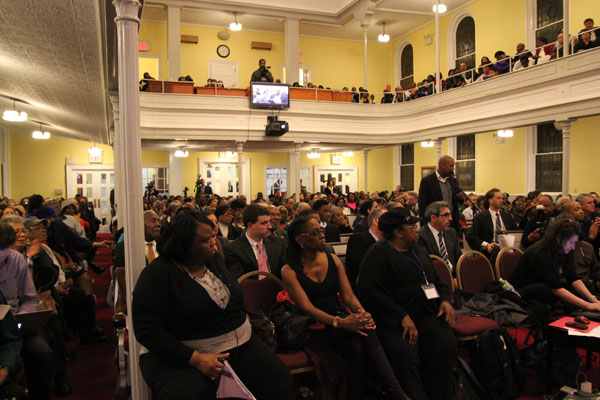
Last night's public safety mayoral forum featured citizen questions from six leaders with the Metro Industrial Areas Foundation, who were picked to represent the views of New Yorkers. After the program, we asked each questioner whether the candidates addressed their concerns and whether one of the mayoral hopefuls stood out on the crowded stage.
Blanche Romey
Member, Duncan Genns Senior Center, Brooklyn
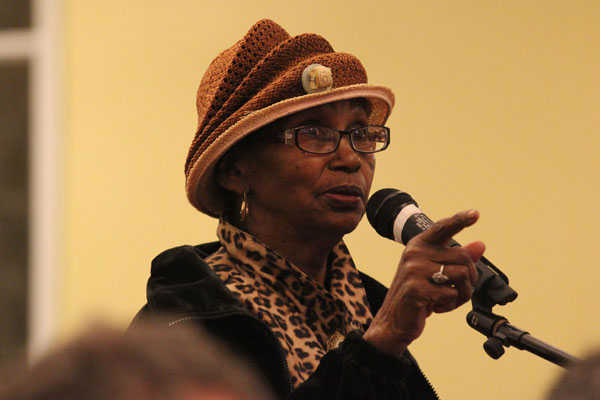
QUESTION: New York is a much safer city than it was more than 20 years ago. In the last two years, I’ve worked with local precinct commanders to shut down two drug dens on my block. But there are still parts of the city that remain unsafe. My question is will you drive crime lower than it is today and what would be your three most important strategies?
Did the candidates answer your question? Well I give them a “fair” because we’re going to keep our eyes on them. This is our city and not theirs. They could do better.
Which candidate gave the best answer? Quinn. I like her. She understands what we are going through and that the main thing is sitting down with police to stop crime in our communities.
Brandon Gibson
Member, Hope Christian Center, Brooklyn
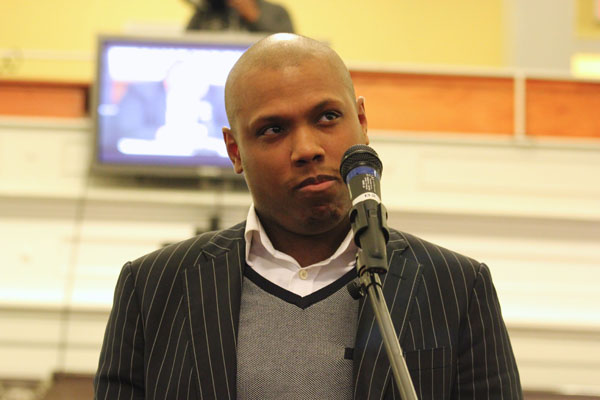
QUESTION: I have a question for all of you. Just out of a show of hands, how many of you have been stopped and frisked? Well I have, at least 20 times. What is your best estimate for how important stop, question and frisk has been in reducing crime?
Did the candidates answer your question? They’re politicians so they emotionalize things to get a response out of the crowd. But I appreciate those candidates who got to the core of the issue.
Which candidate answered your question best? Honestly I liked Joe Lhota and I liked Bill Thompson. I liked Lhota because his answer was measured and there was no pandering. Although Thompson emotionalized his answer, he also raised a good point in talking about his son.
David Haberer
Pastor, Church For All Nations, Manhattan
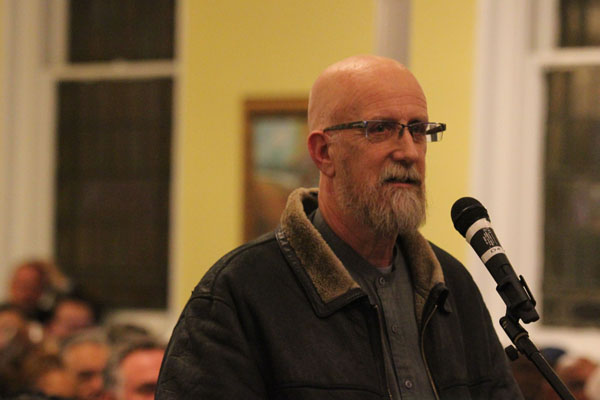
QUESTION: There’s no question that the city is safer now than when Commissioner Kelly came in. My question is simple. If you were elected mayor, would you keep Commissioner Kelly, yes or no?
Did the candidates answer your question? Some people did well. De Blasio had a point — do you teach an old dog new tricks? When do you bring in someone new to shake things up a bit? This question about an inspector general is a real question. This is New York City, it’s a mayor-centric town. That person has to be responsible for all things that happen to the city.
Which candidate answered your question best? I don’t know if there’s a best answer. At this point, it’s not an either/or, it’s you revealed your position, so how are you going to translate that into good government?
Kadeem Mullings
Sophomore, Andrew Jackson High School, Queens
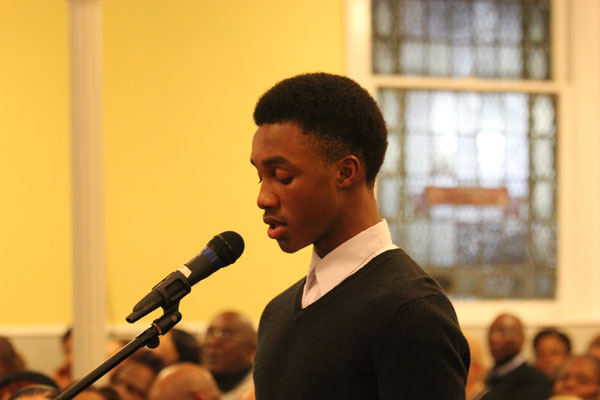
QUESTION: Two months ago, I was heading from school to a church program when I was mugged. Too many students are victims, and that has to stop. My question is will you commit to providing more safe corridors for students, and, if more control is needed, how will you do it?
Did the candidates answer your question? They did, I thought. John Liu answered my question and so did Bill Thompson.
Which candidate answered your question best? Thompson. When he had referred to history, I felt he knows how hard it is.
Maribel Baez
Tenant, Melrose Houses, Bronx

QUESTION: These days crime is often indoors. It’s in the hallways, elevators and stairwells of NYCHA where 600,000 New Yorkers live. I’m tired of risking my safety and life when I go home. In your first year as mayor, will you make safety in NYCHA a priority and what are two or three specific things you will do?
Did the candidates answer your question? A little, not much. When one of them becomes mayor, we’ll see what happens.
Which candidate answered your question best? Thompson. He came straight out. But, then again, all of them said the same thing. I’m looking for someone that’s going to bring down crime in our buildings.
Richard Gibbs
Former police officer, Queens
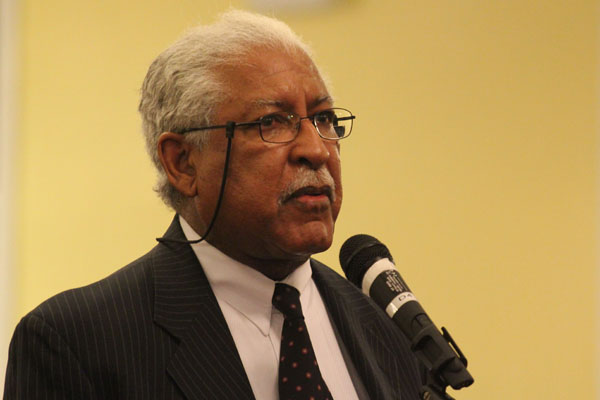
QUESTION: The NYPD is one of the largest purchasers of guns. As mayor, will you lead the NYPD and other law enforcement agencies to push firearm manufacturers to end sales to dealers whose guns are frequently used in crimes in New York City?
Did the candidates answer your question? They all want to do something about it, although nobody gave me an exact plan. There’ll be more interviews and open discussions like this, so if we don’t see that in their rhetoric then there’s a problem somewhere.
Which candidate answered your question best? They all basically commented that they would do something. I didn’t hear something specific, but they all agreed that it’s a concern.




